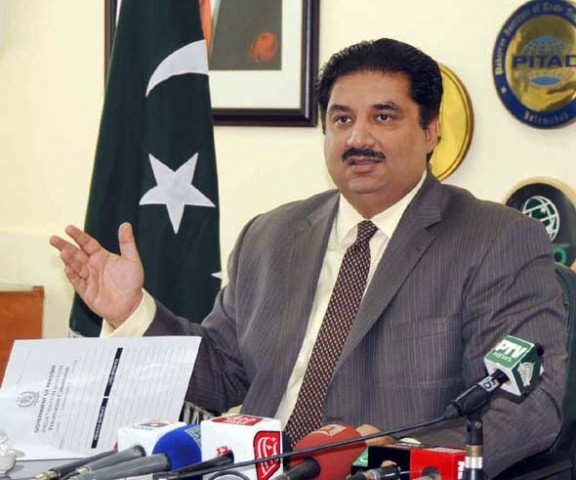Taxes hurt export competitiveness: Dastgir
Trade policy framework finalised, to be presented to ministerial body

Khurram Dastagir Khan. PHOTO: PID/FILE
Taxes on commodities having demand in regional markets hurt Pakistan’s competitiveness compared to its rivals and lead to a decline in exports, says Khurram Dastgir, the federal minister of commerce.
Talking to The Express Tribune here on Monday, Dastgir spoke about the new trade policy, saying the commerce ministry had finalised the draft framework and would give a presentation next week to the ministerial committee on economic issues, headed by Finance Minister Ishaq Dar, which would review the draft.
Last month, Prime Minister Nawaz Sharif had constituted the committee, consisting of 11 members, to take crucial decisions on economic policy on behalf of the federal cabinet. The body comprises ministers of planning and development, commerce, industries and production, national food security and textile as well as parliamentary secretaries of these ministries.

“After clearance from the ministerial committee, the policy framework will be presented to the prime minister for final approval,” Dastgir said.
The new policy focuses mainly on increasing annual exports to $40 billion in the next three years and also identifies the bottlenecks with recommendations for their removal.
The key challenges, according to the minister, include a complicated tax policy, energy shortage, undue delay in release of tax refunds to exporters and the fragile security situation because of the threat of terrorism and extremism.
The minister, however, admitted that the export target under the new framework was a bit difficult, but stressed that it could be achieved through establishing a sustainable and comprehensive export mechanism. It is because of this reason that the government is taking steps to highlight the improved quality of Pakistani goods across the globe.
He noted that tax on export goods affected the competitiveness of Pakistan’s products in the region. A complicated tax policy was also a hurdle in the way of shipments to overseas markets and there was a need to rationalise tariffs by removing surcharges from export commodities, he said.
Dastgir revealed that the government had allocated Rs6 billion this year under the new trade policy framework, which would be notified and come into effect immediately for the convenience of business community.
During the recent visit of Prime Minister Nawaz Sharif to Belarus, the Belarusian leadership assured Pakistan that they would assist in increasing exports to the Eurasian Economic Union. Belarus is part of the Eurasian Economic Union - a customs union - along with the Russian Federation and Kazakhstan.
Pakistan considers the union as one of the major trading partners in the future and has asked Belarus to support and put forward its case to the Eurasian Economic Commission for concluding a free trade agreement between the two sides.
“During the premier’s trip, we identified the potential market for the export of pharmaceutical, food and textile goods and discussions were held with Belarusian authorities in this regard,” Dastgir said.
He particularly pointed to the untapped market for Pakistan’s pharmaceutical products, which would be explored.
Published in The Express Tribune, August 18th, 2015.
Like Business on Facebook, follow @TribuneBiz on Twitter to stay informed and join in the conversation.



















COMMENTS
Comments are moderated and generally will be posted if they are on-topic and not abusive.
For more information, please see our Comments FAQ